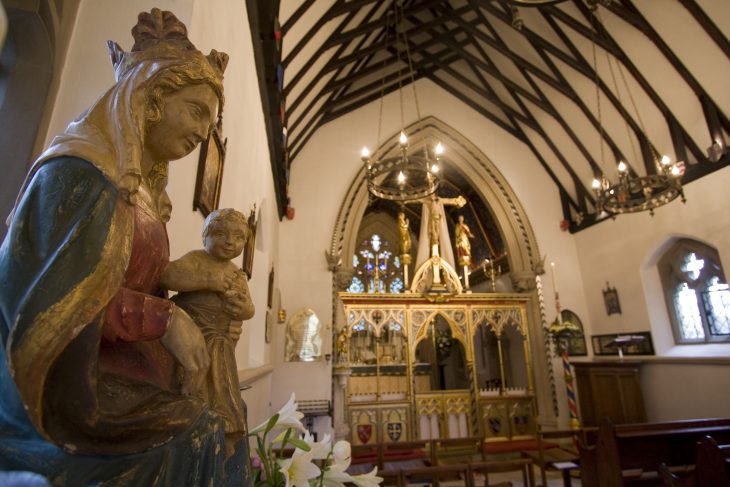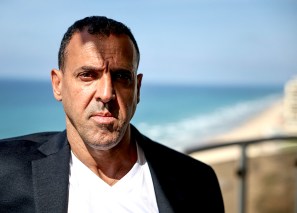‘I’m still warmed up from last night,’ said Sophie Bevan early on a Sunday morning in the practice-room behind the presbytery of St Birinus Catholic Church in the charming village of Dorchester-on-Thames, Oxfordshire – a tiny Pugin-esque gem dwarfed by the enormous Anglican abbey up the road. She and the other four members of the Davey Consort (two of them her cousins from the musical Bevan clan) were running through a Renaissance polyphonic mass, with Sophie’s husband, the composer and conductor Ryan Wigglesworth, directing from the practice harpsichord.
Bevan had been the soprano soloist in Beethoven’s Ninth at the Festival Hall the previous evening, and tomorrow she and her husband would be flying to Helsinki for the week, where she would sing his orchestral song cycle and he would conduct Mahler’s Fifth Symphony. They’re one of the golden couples of the music scene. She’ll be singing the part of the Governess in Britten’s Turn of the Screw at Garsington this summer, and Wigglesworth is composing a piano concerto for Paul Lewis to play at this summer’s Proms, as well as launching the Knussen Chamber Orchestra (in memory of Oliver Knussen) at Aldeburgh as well as at the Proms.
Their diaries are booked up two years in advance, but their stipulation to their agents is ‘please keep our diaries free in Holy Week’. And ideally, ‘please make it possible for us to be at home on Sunday mornings’. Here they both are, doing what matters to them almost more than anything: running their small choir at the church they fell in love with when they spotted it one day on a dog-walk near home.
They knocked on the door and met the priest, Fr John Osman, who turned out to be a kindred spirit: a man who cares passionately about musical as well as liturgical beauty and excellence. As he said to me, ‘In this age of ugliness and confusion, the pursuit of beauty is something that can lead us to God. Ugliness cannot satisfy the human soul.’
Quite. From that chance meeting, much followed, including Wigglesworth being received into Catholic Church, their getting married there, and now, the weekly choral Sunday Masses, rich with plainsong and chant propers. They’ve taught the congregation to sing six plainsong settings of the Mass – plainchant being, as Wigglesworth says, ‘one of the most flexible ways of music-making, offering great expressive freedom.’
‘If I have concerts on Saturdays abroad,’ he said, ‘I’ll do everything to be back here by Sunday morning, even if it means getting a 3am flight. Sophie and I have such a peripatetic existence. It makes a huge difference if one day of the week is set, and we’re at home, singing some of the best music in the world – the music that’s most important to me as a composer, too.’ The fact that it’s ‘not transactional – not a concert where you’re contracted to an orchestra’ reminds them what lies at the basis of all their music-making: the sheer love of it. They’ve commissioned (and are still raising money for) a new organ that’s being created by Bernard Aubertin, the French moustachioed organ-building genius. It will be installed in October. On 27 April, Mark Padmore will be singing Schubert’s Winterreise with Wigglesworth at the piano in Dorchester Abbey, to raise money for the planned St Birinus Festival.
‘Good luck to them,’ says the composer Sir James MacMillan, whom I chatted to, as I knew he’d done something similar in Scotland – for ten years he combined his career as a composer with running the music at St Columba’s Dominican church in Glasgow. ‘For years, I tried to gear the music back towards chant. To cut a long story short, I’ve given up. I just felt opposition all the time from within the Catholic Church. I conceded defeat.’
Musicians like Wigglesworth and MacMillan, who love and promote the singing of plainchant, can all too often be branded ‘elitists’ or Tridentinists. ‘We’re looked at as a throwback,’ said MacMillan. ‘I set up Musica Sacra Scotland, and we had two national conferences, but there was a lot of philistinism among the clergy. Every since Vatican II, the church has been saddled with pitiful music that sounds like sub-standard off-Broadway lounge music. That has been a wrong turning, a mistake. When the Pope came to the UK in 2010 there was an attempt to get my Mass stopped. I got very disillusioned.’
The St Birinus initiative is one way of undoing the ‘mistake’; and people are driving across the county to attend their services. Ten miles away. at the Oxford Oratory, a similar thing is happening: the numbers are swelling, in a church where welcoming, musically intelligent priests have created an environment that liberates their new director of music, the composer Matthew Martin, to create musical excellence each Sunday with top professional singers. All it takes is good musicians and non-resistant clergy who treasure the Catholic Church’s musical heritage.
St Birinus will be doing ‘fully polyphonic Tenebrae’ at 9am on Maundy Thursday, Good Friday and Easter Saturday, and there will be feasts of music and liturgy on Easter Sunday and Easter Monday too: the full menu for the truly keen. Oxfordshire now rivals London as a centre of Catholic musical excellence. ‘What we’re doing,’ says Wigglesworth, ‘becomes a model of what’s possible.’






Comments